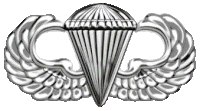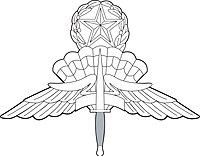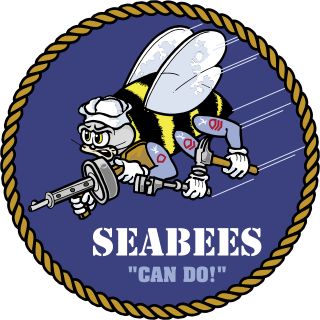
United States Naval Construction Battalions, better known as the Navy Seabees, form the U.S. Naval Construction Forces (NCF). The Seabee nickname is a heterograph of the initial letters "CB" from the words "Construction Battalion". Depending upon context, "Seabee" can refer to all enlisted personnel in the USN's occupational field 13 (OF-13), all personnel in the Naval Construction Force (NCF), or Construction Battalion. Seabees serve both in and outside the NCF. During World War II they were plank-holders of both the Naval Combat Demolition Units and the Underwater Demolition Teams (UDTs). The men in the NCF considered these units to be "Seabee". In addition, Seabees served as elements of Cubs, Lions, Acorns and the United States Marine Corps. They also provided the manpower for the top secret CWS Flame Tank Group. Today the Seabees have many special task assignments starting with Camp David and the Naval Support Unit at the Department of State. Seabees serve under both Commanders of the Naval Surface Forces Atlantic/Pacific fleets as well as on many base Public Works and USN diving commands.

The United States Navy Sea, Air, and Land (SEAL) Teams, commonly known as Navy SEALs, are the U.S. Navy's primary special operations force and a component of the Naval Special Warfare Command. Among the SEALs' main functions are conducting small-unit special operation missions in maritime, jungle, urban, arctic, mountainous, and desert environments. SEALs are typically ordered to capture or kill high-level targets, or to gather intelligence behind enemy lines. SEAL team personnel are hand-selected, highly trained, and possess a high degree of proficiency in direct action (DA), and special reconnaissance (SR), among other tasks like sabotage, demolition, intelligence gathering, and hydro-graphic reconnaissance, training, and advising friendly militaries or other forces.

Rudolph Ernst Boesch was a United States Navy SEAL, and two-time competitor on the reality competition show Survivor.
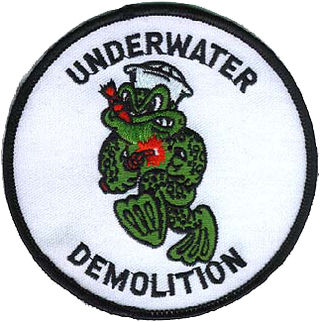
The Underwater Demolition Team (UDT), or frogmen, were amphibious units created by the United States Navy during World War II with specialized non-tactical missions. They were predecessors of the navy's current SEAL teams.

The United States Naval Special Warfare Command (USNSWC), also known as NAVSPECWARCOM and WARCOM, is the naval component of United States Special Operations Command, the unified command that oversees and conducts the nation's special operations and missions.

The Naval Special Warfare Command, commonly known as the Royal Thai Navy SEALs, is the special operations force of the Royal Thai Navy.

Albert Melrose Calland III was a vice admiral in the United States Navy who was the deputy director for Strategic Operational Planning at the National Counterterrorism Center and commander of Naval Special Warfare Command from 2002 to 2004. He also previously served as Deputy Director of the Central Intelligence Agency from July 2005 to July 2006 and commanded the Naval Special Warfare Development Group from 1997 to 1999.
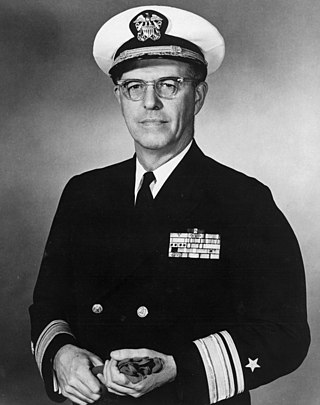
Rear Admiral Draper Laurence Kauffman was an American underwater demolition expert, who served during the 1960s as 44th Superintendent of the United States Naval Academy. During World War II, he organized the first U.S. Navy Combat Demolition Units from which the SEALs and Navy Explosive Ordnance Disposal (EOD) would evolve. His wartime service also included participation in the invasions of Saipan, Tinian, Iwo Jima, and Okinawa.

The Civil Engineer Corps (CEC) is a staff corps of the United States Navy. CEC officers are professional engineers and architects, acquisitions specialists, and Seabee Combat Warfare Officers who qualify within Seabee units. They are responsible for executing and managing the planning, design, acquisition, construction, operation, and maintenance of the Navy's shore facilities. The Civil Engineer Corps is under the command of the Chief of Civil Engineers and Commander, Naval Facilities Engineering Systems Command. On 12 August 2022, RADM Dean VanderLey relieved RADM John W. Korka, becoming the 46th commander of NAVFAC and Chief of Civil Engineers.

The US employs divers in several branches of the armed forces, including the navy, army, marines, air force and coast guard.
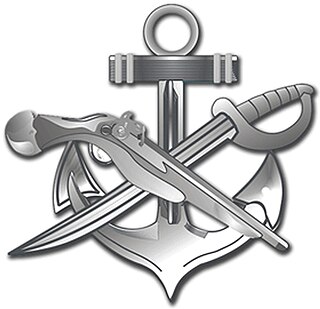
The Special Warfare Combat Crewmen (SWCC ) are United States Naval Special Warfare Command personnel who operate and maintain small craft for special operations missions, particularly those of U.S. Navy SEALs. Their rating is Special Warfare Boat Operator (SB).

The Republic of Korea Navy Special Warfare Flotilla is a special operations force of the Republic of Korea Navy. The WARFLOT is most commonly referred to as the Underwater Demolition Team or UDT, and sometimes as UDT/SEALs, coming from the fact UDTs are the most prominent branch of the flotilla and their close ties with US Navy SEALs respectively.
The Special Warfare Diving and Salvage (SWADS) is an elite special operational unit of the Bangladesh Navy. Members are professional soldiers and are recruited through the Bangladesh Navy. The SWADS is organized, trained and equipped along the lines of SEAL/UDT teams of the United States Navy SEALs and the Republic of Korea Navy UDT/SEAL.

The Naval Special Warfare Development Group (NSWDG), abbreviated as DEVGRU[note A] and commonly known as SEAL Team Six, is the United States Navy component of the Joint Special Operations Command (JSOC). The unit is often referred to within JSOC as Task Force Blue. DEVGRU is administratively supported by Naval Special Warfare Command and operationally commanded by JSOC. Most information concerning DEVGRU is designated as classified, and details of its activities are not usually commented on by either the United States Department of Defense or the White House. Despite the official name changes, "SEAL Team Six" remains the unit's widely recognized moniker.

Sean Averell Pybus is a retired United States Navy vice admiral who last served as the deputy Commander, United States Special Operations Command from 2014 to 2016. He previously served as the Commander, Naval Special Warfare Command from 2011 to 2013.

Raymond Charles Smith Jr. was a United States Navy rear admiral who commanded the Naval Special Warfare Command from 1992 to 1996.

Thomas R. Richards is a retired United States Navy rear admiral who commanded the Naval Special Warfare Command from 1996 to 1999.

Keith Bently Davids is an American United States Navy special warfare officer with the rank of rear admiral. He has served as the commander of Naval Special Warfare Command since August 19, 2022. He was the commander of U.S. Special Operations Command South, United States Southern Command from 2020 to 2022. Previously, he served as director of the White House Military Office during the Presidency of Donald Trump. Earlier in his career, he was commanding officer of the Naval Special Warfare Center and SEAL Team One.



